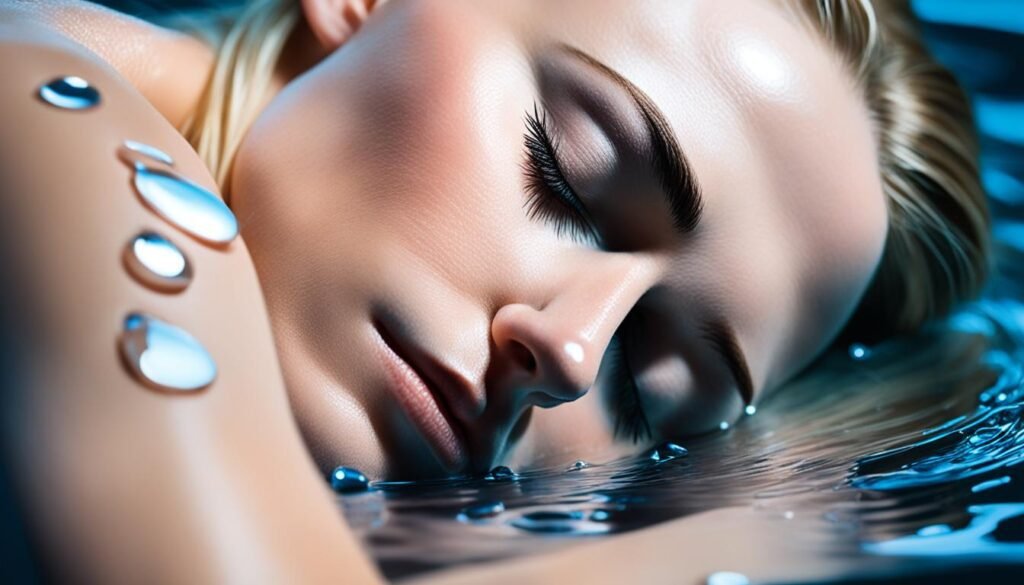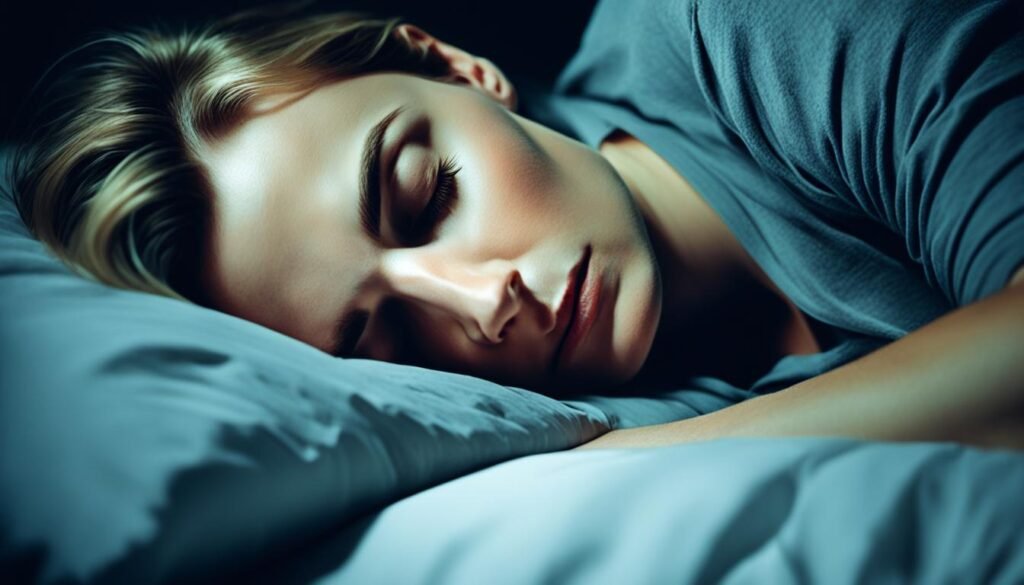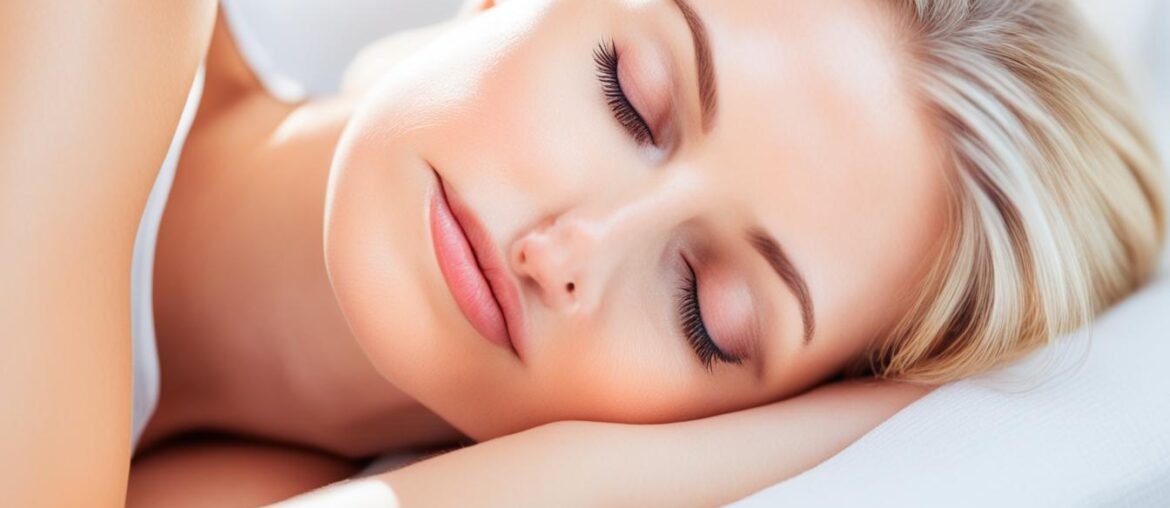Did you know that sleep plays a crucial role in maintaining the health of your skin? It’s true! The quality of your sleep directly impacts the aging process and barrier function of your skin. In fact, a study on caucasian women revealed that good sleepers have lower signs of aging and better skin barrier recovery compared to poor sleepers. So, if you want to achieve that coveted healthy and glowing complexion, getting enough quality sleep is a must.
When you prioritize sleep, you give your skin the opportunity to repair and revive itself. Let’s dive deeper into the science behind this phenomenon and explore the effects of poor sleep on your skin. You’ll discover why it’s essential to prioritize sleep for the sake of your skin’s health and radiance.
Key Takeaways:
- Sleep plays a crucial role in maintaining skin health and preventing the signs of aging.
- During sleep, your body goes through stages that contribute to skin repair and restoration.
- Poor sleep can lead to dry skin, dull complexion, dark circles under the eyes, and accelerated aging.
- Proper sleep hydration is important for maintaining healthy and moisturized skin.
- Lack of sleep can affect the radiance of your skin and contribute to the development of dark circles.
The Science Behind “Beauty Sleep”
During sleep, our bodies go through three distinct stages that contribute to the restoration and repair of the skin.
- Somatotropin Production: In the first three hours of sleep, the pituitary gland produces somatotropin, the human growth hormone. This hormone is essential for maintaining youthful and healthy skin, aiding in cell renewal and repair.
- Melatonin as an Antioxidant: The next two hours of sleep are characterized by increased melatonin production. Melatonin acts as an antioxidant, protecting the skin from free radicals that can cause damage and premature aging.
- REM Sleep and Collagen Production: During REM (Rapid Eye Movement) sleep, cortisol levels decrease, skin temperature decreases, and collagen production increases. Collagen is a crucial protein for maintaining the skin’s elasticity and structure, helping it to recover and rejuvenate.
These processes underline the importance of quality sleep for overall skin health and repair.
Effects of Poor Sleep on Skin
Poor sleep can have various negative effects on the skin. It can lead to dry skin due to decreased hydration and disrupted pH levels. Inadequate sleep can also cause dull skin, as heightened cortisol levels trigger inflammation and break down skin proteins. This inflammation can make the skin more prone to acne and allergic reactions. Lack of sleep can result in dark circles under the eyes, as blood vessels dilate and oxygen flow decreases. Additionally, chronic poor sleep quality can accelerate the breakdown of collagen, leading to decreased skin firmness and increased signs of aging.
| Effects of Poor Sleep on Skin | Causes | Consequences |
|---|---|---|
| Dry skin | Decreased hydration and disrupted pH levels | Flaky and tight skin |
| Dull skin | Heightened cortisol levels and inflammation | Lackluster complexion |
| Dark circles under the eyes | Dilated blood vessels and reduced oxygen flow | Tired and aged appearance |
| Collagen breakdown | Chronic poor sleep quality | Decreased skin firmness and increased signs of aging |
Importance of Sleep for Skin Hydration

Sleep plays a crucial role in maintaining skin hydration. During sleep, our bodies naturally produce extra perspiration on the skin, which acts as a natural moisturizer and helps smooth out wrinkles. Lack of sleep can disrupt this hydration balance and lower pH levels, leading to dry skin. Adequate sleep is essential to ensure proper hydration levels and prevent skin dryness.
When we sleep, our bodies undergo various physiological processes that contribute to skin hydration. One important factor is perspiration. While it may seem inconvenient to wake up with a slightly sweaty face, perspiration actually helps maintain skin moisture. As we sleep, perspiration occurs, allowing water to be released through the sweat glands onto the skin’s surface. This process acts as a natural moisturizer, keeping the skin hydrated and preventing dryness.
Another aspect to consider is the role of temperature regulation during sleep. Our body temperature naturally decreases during sleep, causing the blood vessels in our skin to constrict. This constriction reduces the loss of moisture from the skin, helping to maintain hydration levels.
Proper sleep also optimizes the skin’s pH levels, which is crucial for hydration. The skin’s ideal pH level is slightly acidic, creating an environment that helps retain moisture. However, lack of sleep disrupts this balance, leading to an increase in alkaline pH levels that can contribute to dryness and irritation.
In addition to perspiration and pH regulation, sleep also plays a vital role in other aspects of skin health, such as collagen production and repair processes. Collagen is a protein that provides structure and elasticity to the skin. During sleep, our bodies have the opportunity to repair and replenish collagen, helping to maintain its integrity and prevent dehydration.
It is important to prioritize quality sleep and establish healthy sleep habits to ensure optimal skin hydration. Aim for a consistent sleep schedule, providing your body with enough time to undergo the necessary restorative processes. Create a sleep-friendly environment that is cool, dark, and quiet, allowing for uninterrupted sleep. Reduce the use of electronic devices before bed to promote relaxation.
Additionally, practicing good sleep hygiene, such as avoiding caffeine and stimulating activities close to bedtime, can further support skin hydration. Taking these steps to improve sleep quality can have profound effects on skin health and overall well-being.
Sleep and Skin Radiance
Inadequate sleep can have a significant impact on the radiance of your skin. When you don’t get enough sleep, it can show on your face, making your skin appear dull and lacking vibrancy. This is due to several factors that are directly influenced by sleep deprivation.
One of the key contributors to a lackluster complexion is heightened cortisol levels. Cortisol, also known as the stress hormone, increases when you’re sleep-deprived. This can lead to inflammation in the body, which can manifest as skin redness and irritation. Additionally, cortisol can break down collagen, a protein that keeps the skin firm and plump, resulting in a tired and aged appearance.
Furthermore, inadequate sleep can lead to reduced blood circulation, which can negatively impact your skin’s radiance. When blood flow is compromised, the skin receives less oxygen and nutrients, leading to a pale and lackluster complexion. Insufficient oxygenation can also result in the skin appearing blotchy and grayish.
Poor sleep can also disrupt the skin’s natural balance, leading to various skin concerns. When you don’t get enough rest, your skin can become dehydrated and lose moisture, resulting in dry, flaky skin. On the other hand, inadequate sleep can trigger an overproduction of sebum, the skin’s natural oil. This excess oil can clog pores and contribute to the formation of acne and breakouts.
To maintain a clear and radiant complexion, quality sleep is essential. Prioritizing a consistent sleep routine and getting enough hours of rest can help regulate cortisol levels, improve blood circulation, and support the skin’s natural rejuvenation processes.
Remember, a good night’s sleep is not just important for your overall well-being; it plays a crucial role in enhancing the radiance and appearance of your skin.
Sleep and Dark Circles Under the Eyes

Dark circles under the eyes can be a bothersome cosmetic concern for many individuals. Lack of sleep is one of the common culprits behind the development of dark circles. When we don’t get enough sleep, blood vessels under the delicate skin around the eyes can dilate, leading to puffiness and discoloration that we associate with dark circles.
Aside from sleep deprivation, there are other factors that can contribute to the appearance of dark circles. Iron deficiency can cause the skin under the eyes to appear darker, as it affects the oxygen-carrying capacity of the blood. Additionally, naturally thin or sagging skin can make the underlying blood vessels more noticeable, resulting in the appearance of dark circles.
“Lack of sleep can contribute to the development of dark circles under the eyes.”
To address dark circles under the eyes, it’s important to focus on improving sleep quality and addressing the underlying causes. While over-the-counter creams can provide temporary relief by concealing the dark circles, they do not address the root cause.
Table: Remedies for Dark Circles
| Remedy | Description |
|---|---|
| Get sufficient sleep | Make sure to prioritize quality sleep, aiming for 7-9 hours of restful sleep each night. |
| Treat underlying health conditions | If iron deficiency is a contributing factor, consult with a healthcare professional to address any deficiencies through proper diet or supplementation. |
| Take care of your skin | Use gentle skincare products to nourish and hydrate the delicate skin under the eyes. Consider applying cold compresses or cooling eye masks to reduce puffiness. |
| Manage stress | Practicing stress-reducing activities such as meditation, yoga, or deep breathing exercises can help improve sleep quality and reduce the appearance of dark circles. |
By prioritizing sufficient sleep and addressing any underlying factors contributing to dark circles, individuals can work towards long-term improvements in the appearance of the under-eye area.
Sleep and Collagen Production
Sleep plays a vital role in collagen production, a protein that maintains skin elasticity and firmness. Collagen is responsible for providing structure to the skin, helping it stay youthful and supple. When we sleep, our bodies have the opportunity to repair and renew skin cells, including the production of collagen.
Chronic stress caused by lack of sleep can lead to increased cortisol levels, which can damage collagen and hinder its production. Cortisol is a stress hormone that can break down collagen and result in decreased skin firmness, elasticity, and increased visible signs of aging.
On the other hand, when we get good quality sleep, it promotes collagen production and allows the skin to undergo optimal repair and renewal. During sleep, our bodies release growth hormones that stimulate collagen synthesis, supporting the skin’s natural rejuvenation process.
Adequate sleep also helps reduce inflammation in the body, which can contribute to collagen breakdown. By prioritizing regular and restful sleep, we can support the production of collagen and maintain the health and youthfulness of our skin.
Getting enough sleep and managing stress levels are essential for collagen preservation. Incorporating healthy sleep habits into your routine can help maintain skin elasticity, reduce the visible signs of aging, and promote overall skin health.
Tips for Improving Sleep for Skin Health

To improve the quality of your sleep and promote optimal skin health, it is important to establish a bedtime routine and follow good sleep hygiene practices. By incorporating these habits into your daily routine, you can enhance sleep quality and prioritize skin health. Here are some tips to help you improve your sleep:
- Maintain a regular sleep schedule: Try to go to bed and wake up at the same time every day, even on weekends. This helps regulate your body’s internal clock and promote more consistent and restful sleep.
- Create a sleep-friendly environment: Ensure your bedroom is quiet, dark, and at a comfortable temperature. Use earplugs, curtains, or white noise machines to reduce any disruptive sounds or lights that may interfere with your sleep.
- Avoid electronic devices before bed: The blue light emitted by smartphones, tablets, and computers can interfere with your sleep patterns. Try to limit screen time at least an hour before bedtime to allow your mind to relax and prepare for sleep.
- Exercise regularly: Engaging in regular physical activity during the day can help improve sleep quality. However, avoid exercising too close to bedtime, as it may increase alertness and make it harder to fall asleep.
- Wind down before sleep: Establish a relaxing bedtime routine to signal to your body that it’s time to sleep. This may include activities like reading a book, practicing gentle stretching or yoga, taking a warm bath, or listening to calming music.
- Practice good hygiene: Take care of your skin before bed by washing your face to remove dirt, oil, and makeup. Use gentle cleansers suitable for your skin type and apply moisturizers to keep your skin hydrated and healthy.
- Avoid stimulants: Limit your intake of caffeine and avoid heavy meals, nicotine, and alcohol before bedtime. These substances can disrupt your sleep patterns and make it more difficult to fall asleep or stay asleep throughout the night.
Incorporating these tips into your routine can help improve the quality of your sleep and contribute to better skin health. Remember, prioritizing sleep hygiene is as important as maintaining a consistent skincare routine for promoting overall skin health and radiance.
Getting Professional Skin Treatment

If sleep alone is not improving your skin health, seeking professional dermatology services can be a beneficial option. Dermatologists specialize in providing a range of treatments customized to address individual needs and concerns. These dermatology services offer various skin treatment options, including:
- Prescription creams: Dermatologists can prescribe topical medications that target specific skin issues such as acne, rosacea, or eczema.
- Laser therapy: This non-invasive treatment uses laser technology to address skin concerns like fine lines, wrinkles, scars, or pigmentation irregularities.
- Chemical peels: Dermatologists perform chemical peels to exfoliate and rejuvenate the skin, improving texture and reducing signs of aging, sun damage, and scarring.
- Injectable fillers: Injectable dermal fillers are used to restore volume, plump up the skin, and reduce the appearance of wrinkles and fine lines.
- Surgical procedures: In some cases, dermatologists may recommend surgical procedures such as skin tightening, skin resurfacing, or mole removal for specific skin concerns.
These dermatological treatments can effectively target your skin concerns, stimulate collagen production, and restore the youthfulness and vitality of your skin. By consulting a dermatologist, you can receive personalized recommendations based on your skin’s unique needs and achieve the desired improvements.
Collagen Restoration: Rejuvenating Your Skin
One of the key goals in professional skin treatment is collagen restoration. Collagen is a protein that forms the structural framework of the skin, providing firmness and elasticity. Over time, collagen production naturally decreases, leading to signs of aging such as wrinkles, sagging, and loss of firmness.
Dermatologists employ various techniques to stimulate collagen production and replenish its levels in the skin. These may include laser treatments, microneedling, or the use of specific skincare products. By targeting collagen restoration, dermatological treatments can help rejuvenate your skin, minimizing the visible signs of aging and promoting a more youthful appearance.
Choosing the Right Dermatologist
When seeking professional skin treatment, it is important to choose a reputable and experienced dermatologist. Look for board-certified dermatologists who have a track record of successful treatments and positive patient reviews. Consider scheduling consultations with different dermatologists to discuss your concerns, expectations, and treatment options. This will help you make an informed decision and find a dermatologist who understands your needs and can provide personalized care.
Emphasizing the Importance of Sleep for Skin Health

Prioritizing quality sleep is crucial for overall skin health and rejuvenation. Adequate sleep plays a significant role in the repair and renewal processes of the skin, ensuring its optimal condition. One of the key benefits of sleep is its ability to boost collagen production, a protein that maintains the skin’s elasticity and firmness. Collagen helps in reducing the visible signs of aging, such as wrinkles and fine lines.
Additionally, sleep helps to maintain proper hydration levels in the skin, resulting in a vibrant and glowing complexion. During sleep, the body performs various functions to replenish moisture, improve blood circulation, and support the skin’s natural rejuvenation process.
Proper sleep is the foundation for radiant and youthful-looking skin. It allows the skin to repair damage, produce essential proteins, and maintain a healthy moisture balance.
By prioritizing sleep, individuals can optimize their skin’s health and enhance their overall appearance. Adequate rest helps to reduce stress levels, which can have a negative impact on the skin. During sleep, the body releases hormones that regulate inflammation and repair damaged cells, contributing to a rejuvenated and revitalized complexion. Moreover, quality sleep can also help in reducing skin conditions like acne, rosacea, and eczema.
It is important to incorporate healthy sleep habits into daily routines. Establishing a consistent bedtime routine and following good sleep hygiene practices can contribute to improved sleep quality. This includes creating a relaxing sleep environment, avoiding stimulating activities before bed, and practicing stress-reducing techniques such as meditation or gentle stretching.
Sleep and Aging
The relationship between sleep and aging is well-established. Chronic sleep deprivation can accelerate the aging process, leading to increased wrinkles, sagging skin, and a dull complexion. Lack of sleep disrupts the body’s natural repair mechanisms and inhibits collagen production, which can result in premature aging.
Sleep and Skin Rejuvenation
During deep sleep, the body enters a phase of heightened cellular repair and rejuvenation. This is when the skin’s renewal process is at its peak, allowing for the replacement of old and damaged cells with new, healthier ones. Adequate sleep duration and quality are essential for this rejuvenation process to occur effectively.
Prioritize Sleep for Skin Health
Understanding the importance of sleep for skin health is crucial for achieving and maintaining a youthful and glowing complexion. By prioritizing quality sleep and adopting healthy sleep habits, individuals can significantly improve their skin’s overall health and appearance.
| Sleep Habits | Effects on Skin Health |
|---|---|
| Consistent sleep schedule | Promotes optimal skin repair and rejuvenation |
| Creating a sleep-friendly environment | Enhances relaxation and supports skin hydration |
| Avoiding stimulating activities before bed | Reduces stress levels and inflammation in the skin |
| Practicing stress-reducing techniques | Supports overall skin health and reduces the risk of skin conditions |
Conclusion
Sleep plays a significant role in maintaining skin health. From maintaining hydration and radiance to promoting collagen production and reducing the appearance of dark circles, quality sleep is crucial for achieving a glowing and healthy complexion. Chronic poor sleep quality can accelerate skin aging and hinder the skin’s natural ability to repair and rejuvenate itself.
To prioritize skin health, it is essential to establish a bedtime routine and follow good sleep hygiene practices. By maintaining a regular sleep schedule, creating a sleep-friendly environment, and practicing relaxation techniques before bed, individuals can improve their sleep quality and support their skin’s vitality.
Remember, sleep is more than just a restful period. It is a time when our bodies undergo essential processes that contribute to healthy and vibrant skin. By giving utmost importance to sleep and making conscious efforts to improve its quality, we can optimize our skin’s health, slow down the aging process, and achieve a youthful and radiant appearance.
FAQ
How does sleep affect skin health?
Sleep plays a crucial role in maintaining skin health. It supports skin repair and rejuvenation, collagen production, hydration, and overall skin vitality.
What is the science behind “beauty sleep”?
During sleep, our bodies go through different stages that contribute to the restoration and repair of the skin. These stages involve the production of growth hormones, melatonin as an antioxidant, decreased cortisol levels, decreased skin temperature, and increased collagen production.
What are the effects of poor sleep on the skin?
Poor sleep can lead to dry skin, a dull complexion, dark circles under the eyes, and accelerated skin aging. It can also disrupt the skin’s barrier function and decrease collagen production.
Why is sleep important for skin hydration?
Sleep helps maintain skin hydration by promoting perspiration, which acts as a natural moisturizer. It also helps balance pH levels and prevent skin dryness.
How does sleep affect skin radiance?
Inadequate sleep can lead to dull and pigmented skin due to heightened cortisol levels and reduced blood circulation. Lack of oxygen in the blood can also result in a grayish and blotchy complexion.
Can lack of sleep cause dark circles under the eyes?
Yes, sleep deprivation can cause dark circles under the eyes. It leads to blood vessel dilation, puffiness, and a decrease in oxygen flow, resulting in discoloration.
How does sleep influence collagen production?
Sleep promotes collagen production, which is essential for maintaining skin elasticity and firmness. Chronic stress caused by lack of sleep can lead to increased cortisol levels, damaging collagen and accelerating skin aging.
What are some tips for improving sleep for skin health?
To improve sleep quality, establish a bedtime routine, follow good sleep hygiene practices, maintain a regular sleep schedule, create a sleep-friendly environment, exercise regularly, wind down before sleep, avoid electronic devices, practice good hygiene, and use suitable moisturizers.
Is professional skin treatment recommended if sleep alone is not improving skin health?
Yes, seeking professional dermatology services can be beneficial. Dermatologists can provide tailored treatments such as prescription creams, laser therapy, chemical peels, injectable fillers, and surgical procedures to target specific skin concerns, stimulate collagen production, and restore skin vitality.
Why is sleep emphasized for skin health?
Sleep is crucial for maintaining skin health and rejuvenation. It supports the repair and renewal processes of the skin, collagen production, hydration, and a vibrant complexion. Prioritizing quality sleep is essential for optimal skin health and delaying the aging process.
Conclusion
Sleep has a significant impact on skin health. Adequate sleep supports skin repair, collagen production, hydration, and overall skin vitality. By prioritizing quality sleep and following good sleep habits, individuals can promote optimal skin health and achieve a glowing complexion.




